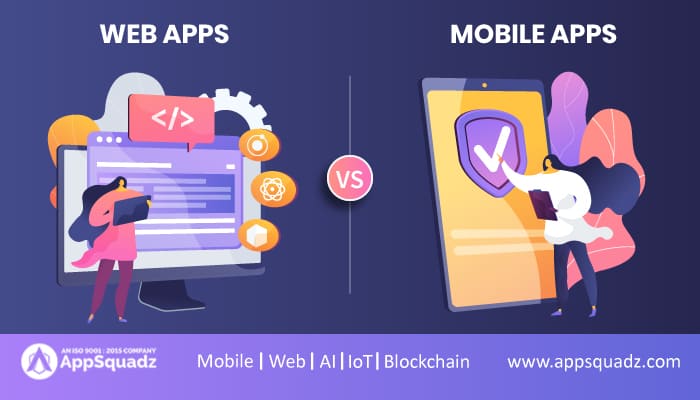As technologies for both web and mobile apps have developed quickly, organizations fall into the problem of choosing the correct medium to arrive at target customers. There are situations in which a web application development company can grow either a web app or a mobile app because of spending constraints.
In any case, most entrepreneurs don’t have the foggiest idea about the distinction among them, and what effect will choose either have on their business. Consequently, the task of assessing the correct one for their business is on-to them. Mobile application and web app both are very different from each other.
This turns into a ‘Mobile App Vs Web app’ situation for them.
What is a Mobile App?
Mobile Apps are a piece of our everyday schedule and there are not many who live in an isolated world away from Mobile apps. Any application that can run on a handheld or mobile gadget (like a smartphone or tablet) with a function of offering assistance to its users is classified as a mobile application.
An expansive distinction of Mobile Apps can be made into Native and Hybrid mobile apps.
Native Mobile Application
Mobile apps that are made for a focused-on platform using the platform-specific SDK are arranged into Native Mobile Apps. Most Native mobile apps are focused on Android development (assembled using the Android framework) or iOS development (using XCode or Swift). On account of Native mobile apps, performance and similarity with the basic equipment are the essential focus.
What is a Web App?
Web Application is a self-sustaining software by a web app development company that runs on the web browser. The web application shouldn’t be downloaded and installed on the neighborhood machine of the end-user. The web applications can span over various pages or be restricted to a single page.
The advantage of building a web app is that it tends to be used across web browsers irrespective of the basic platform. They don’t need to be custom-worked for a platform or equipment. Thus, it reduces the general development efforts needed in contrast to composing code that needs to be relocated over different platforms.
A significant test most organizations foresee is language similarity of Web applications. It is safe to say that we are supposed to assemble a unique app obliging each significant language or be reliant on standard translators? For hurdles that you face while building Multilingual Web Applications – do peruse the accompanying site.
Web Apps vs Mobile Apps – Comparison
The all-out time users spend on websites when using desktop devices is bigger than the complete time for mobile. A normal mobile user spends additional time on Mobile applications than a web browser. The day-by-day time spent on mobile and desktops is 132mins and 39mins respectively.
Benefits of using a Web App
Fast and Reliable
Ordinary web apps are exceptionally subject to the data transfer capacity of the organization. Progressive web apps are easy, and they refresh instantly, except the organization. Pre-storing enables PWAs to dispose of the reliance on the organization. ‘Service Worker’ is a concept by google which involves a script that runs in the web app development company free of the webpage. This gives the developers full oversight over even disconnected experiences.
Development Cost
PWAs are easier to create and are scalable as they use a single-codebase. At the point when your mobile applications are performance-driven, it is suggested that they be created on a native platform. Consequently, they should be custom made for every platform that they should be hosted on. Regardless of whether they are created on a crossover platform, the cost of development and upkeep of a mobile app is more than that of a PWA.
Refreshed at Real-Time
Not at all like mobile apps that require the users to go to the app store and download the update, PWAs are refreshed continuously. Consequently, once the developer pushes an update it is reflected all users naturally. This enables ordinary improvements in functionality and features without upholding users to make any move. This resolves the issue of any basic platform being obsolete or End-of-service for any difficult OS.
Benefits of using the mobile app
High performance
Performance issue never comes most face when using mobile apps. High-performing websites show greater commitment with its end-users and thus draw in more rush hour gridlock. As PWAs load faster even on low transfer speed networks they give a superior user experience.
High demand
Albeit the number of users with smartphones and the number of mobile app downloads are surprisingly increasing every year, most users are open to download new apps which are on day-by-day use. The applications that possess around half of the usage are Social Media, Music, and Games.
Integrity
Over half of the app users in 2017 from the U. S. have downloaded many new mobile applications for every month, as indicated by Statista. The learning from here is that users are selective in the apps they download. Mobile apps give them the option of using an online app without having to reload it on their browser.
The term ‘Progressive Web Apps‘ was presented by Chrome Developers – Alex Russel and Frances Berriman at Google. Their vision focused on making better experiences across devices by using a single codebase.
The focus is towards making web applications that see and feel precisely like native apps, without having the users to download and install any software.
Conclusion
Whether it is mobile or web app all depends on the usage and demand coming from the users, numerous renowned web app development companies are trending at a hike for increasing demand for web apps. Web app development is trending has a solid reason this is because the web app is accessible on remote servers and provide regular update o single refresh users do not need to visit PlayStore and look for an update. Web app development needs a good knowledge about them, contact AppSquadz for further assistance in your project completion.




